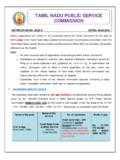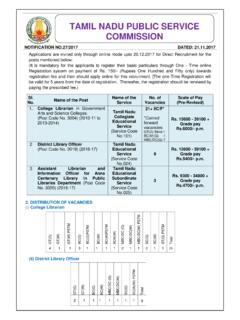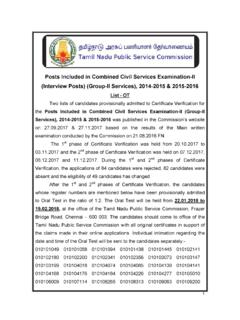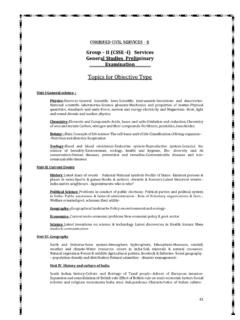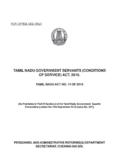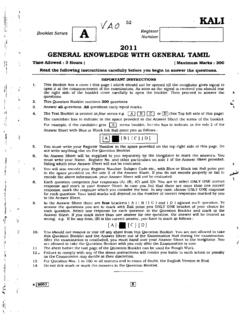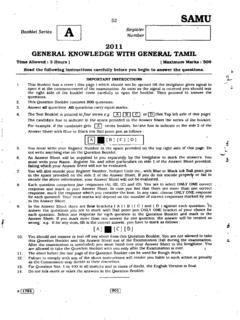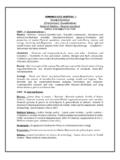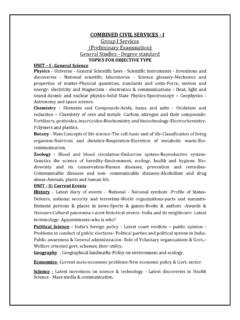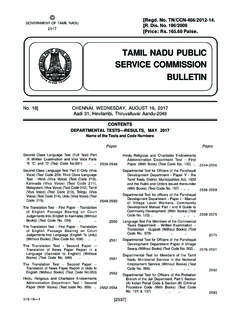Transcription of (OBSTETRICS AND OBSTETRICAL NURSING) POST GRADUATE …
1 NURSING (OBSTETRICS AND OBSTETRICAL NURSING) post GRADUATE DEGREE STANDARD PAPER - I CODE:085 MATERNITY NURSING UNIT I INTRODUCTION Historical and Current perspectives in maternal and child care- Family centered maternity care - Epidemilogy in obstetrics - MMR, PMR, NMR, IMR -Effect of child bearing on the family and society Preventive obstetrics Legal and Ethical aspect of obstetrics Safe Motherhood - Reproductive child health - Expanded and Extended role of Maternity Nurses, Impact of various health Committees recommendations in improving maternal and child care. UNIT II Review Human Reproductive Systems Anatomy and Physiology. Human Sexuality, Sexual development - conception and fetal development, Functions and abnormalities of placenta. UNIT III Mental health in obstetric Nursing Emotional needs of the pregnant mother and Family, crisis intervention, Mental health problems during pregnancy and puerperium.
2 Premarital counselling. Normal reactions to pregnancy, Labour and puerperium. Reactions of parents of deformed child and grieving parent. UNIT IV Genetics Review of Genetic disorders, Chromosomal abnormalities. Prediction & Prevention of congenital abnormalities, Genetic counselling. UNIT V Normal pregnancy and Management Physiological changes during pregnancy changes in the reproductive tract - Breast changes- Changes in Cardiac functions and Hemodynamics, Metabolic changes - Changes in respiratory system - gastro intestinal tract, urinary tract endocrine system and Musculoskeletal system. Diagnosis of Pregnancy:- signs and symptoms - Immunological tests, ultrasonic devices, Radiological tests and its hazarad in obstetrics. Methods of child birth preparations Antenatal care - Antenataladivices and Antenatal hygiene - Minor disorders and its management, Maternal assessment and intra - uterine fetal monitoring.
3 UNIT VI Normal Labour and Management First Stage - Physiology, causes of onset and management (Nursing and obstetric) Second Stage - Physiology, mechanism of labour and management. Third stage - Physiology, management. Fourth Stage-observation and Management. UNIT VII Normal puerperium and Management Physiology of puerperium-Physiology of lactation. Assessment and intervention strategies Postnatal exercises. Management of mother during puerperium. Rooming in, Bonding, Warm chain. UNIT VIII Normal Newborn and Management Physiology and Normal characteristic of Newborn, Needs, exclusive breast feeding, Immunisation, Hygiene Measures, observation and care of Newborn, Behavioural assessment of Newborn, Common Neonatal problems. UNIT IX Family Welfare Concept, Population dynamics, demography, Recent advancement in contraceptive technology -Role of nurses in Family Welfare programmes - Education, training and supervision of health - personnel in hospital and community.
4 UNIT X Infertility Primary and Secondary, causes, diagnestic procedures, counselling, Recent advancement in infertility Management, adoption services - Role of nurses in infertility management. PAPER -II UNIT I Comprehensive care and management in Maternal Disorders complicating pregnancy, labour, puerperium and newborn. A) Abnormalities of pregnancy: 1. Conditions associated with bleeding in early pregnancy - Abortion, Ectopic pregnancy, Hydatidiform mole. 2. Hemorrhagic complications of late pregnancy. Antepartum hemorrhage - placenta praevia and Abruptio placenta. 3. Disorders caused by pregnancy- Hyperemesis Gravidarum, Hypertensive disorders - preeclampsia and eclampsia. 4. Disorders associated with pregnancy-Diabetes Mellitus, Cardiac diseases, Anaemia, Hydramnios, Urinary tract and renal conditions, Thyroid disorder. 5. Infectious diseases in pregnancy-Sexually transmitted diseases, AIDS/HIV, Hepatitis B, Urinary tract infections, TORCH, Tuberculosis 6.
5 Structural Abnormalities affecting pregnancy - Uterine Malformations and displacement, Uterine masses, Ovarian cysts, Cervical conditions. B) Abnormal Labour:- 1. Disordered uterine action - Hypertonic dysfunction, Hypotonic dysfunction. 2. Dystocia due to soft tissue abnormalities of reproductive tract. 3. Dystocia due to pelvic contraction - contracted pelvis, Cephalo pelvic disproportion. 4. Malposition and Malpresentation - Ocupito posterior, Breech, face, brow, compound, shoulder presentation and unstable lie. 5. Obstetical Emergencies - Rupture and Inversion of uterus, Cord prolapse, Amniotic fluid embolism, OBSTETRICAL shock. 6. Complications of third stage of Labour-Retained and Adherent placenta, Hemorrhage. (C) Abnormal puerperium: Postpartum hemorrhage, puerperal sepsis and pyrescia, urinary tract infection, Breast infection, Veneus thrombosis, Sub involution of uterus, Incentinence of urine, Mental health problems ( post partal blue, psychosis).
6 D) Abnormal Newborn: Low birth weight, small for gestatrenal age, large for gestational age, prematurity, post maturity, infant of diabetic mother, Asphyscia Neonatorum, Respiratory distress Syndrome, Hycline membrane disease, neonotal jaundice, Hemolytic disease,anaemia, infections, Birth injuries-Congenital anomalies (Diaphragmatic hernia, Tracheeesophageal fistula Atresia-Exemphalous - Anorectal malformations-Spinabifida, Hydrocephalus) Rh incomparibilty, Neonatal seizures, Common metabolic problems. eongenital syphilis, Opthamias neonatorum, Newborn with HIV positive. UNIT II Operative Obstetrics and other procedures:- Forceps, vaccum extraction, caesarean section, Epsiotomy, induction of labour -Medical and surgical induction, Version, Embryotomy,symphisiotomy and cleidotomy, Evisceration. UNIT III Drugs in obstetrics: Analgesics and Anacesthetics in obstetrics oxytocics, Other drugs - Uterine muscle relaxant, methergin etc.
7 , Effect of maternal drugs on the new born. Drugs used in Newborn. Nurse's responsibilities is drug administration. UNIT IV Administration and Management of maternity and Neonatal Unit: Formulating philosophy of unit Establishing objectives Design and layout, Staffing,Setting Standards, Equipment and supplies, budget, Records and Reports. UNIT V Education, Training and Research in Maternity: Staff Development program (Orintation Inservice education) Clinical teaching program Identify problem for research Participate/ conduct research in OBSTETRICAL nursing Implementation of research findings.
